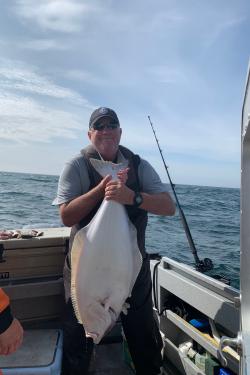What is your earliest memory of fishing?
My earliest memory of fly fishing is with my dad in the California Sierras. It taught me the reason why they call it “fishing” and not “catching,” because I wasn’t a good fly fisher back then. But it didn’t matter. I just loved being outdoors in these gorgeous mountain streams. When I was lucky enough to present a fly and get a wild trout to take it, there was no better feeling than that.
What does recreational fishing mean to you?
Recreational fishing for me is a great opportunity to get together with my friends and spend quality time on the water doing something that we love. It plays a role in my life like golf might for other people. I also personally love it because I feel a connection to the species and the ecosystem. I love being on a tidal rip, seeing the coho salmon darting in and out, seeing the sea birds slamming the water, seeing the dolphins work the same rip. I love it when the ocean comes alive. I also love a freezer full of fish!
Does the fact that you enjoy fishing recreationally help you engage with recreational anglers more effectively?
Being an angler helps me have a better understanding of how important recreational fishing is to others; from maintaining and passing on their family traditions to filling their freezers. I also experience some of the same frustrations with navigating complex regulations. I’d say I have an elevated sense of anxiety because I don’t want to be a NOAA Fisheries official who gets ticketed out on the water! Being a fisherman helps me empathize and better understand the community’s concerns and be an advocate for fishing opportunities.
Overseeing such a large geographic area, how do you see recreational anglers getting involved in West Coast fisheries science and management?
Participating in the recreational fisheries roundtables are really valuable. That's been an important venue for me to hear from the recreational fishing community what their priorities, concerns, and suggestions are. It’s also a great opportunity to build relationships.
Engaging in Pacific Fisheries Management Council meetings is also important for having a voice in management and policy of fisheries. The Marine Resource Education Program is a fantastic opportunity that breaks down barriers to involvement by offering training to better understand the Council process. It teaches participants how to engage in the process effectively.
Anglers can also reach out to our West Coast Recreational Fisheries Coordinator, Daniel Studt, and Recreational Fishing Team, who work directly with leadership to communicate issues of importance. Anglers can also stay in the loop on recreational fishing information of interest and public comment opportunities through our West Coast Recreational Fisheries newsletter. Finally, get involved in your local angling groups. If you can’t engage in the Council process or roundtables, keeping your club representatives informed allows them to pass along messages when they engage with us through these processes.
How do you see climate change affecting West Coast anglers?
Climate change is having an impact. We might not fully fathom the breadth of it, but we see it when we’re out fishing. We’re catching pyrosomes and squids in quantities that are unusual in northern West Coast waters. I’m seeing species in waters that I fish that aren’t typically there; we’re seeing it in the ecosystem already. Along with climate change, we’re getting these more frequent ocean ecosystem events, like marine heat waves and harmful algal blooms, impacting marine survival and distribution in species such as salmon. This will continue to affect recreational and commercial fishing. For me, it underscores the importance of investing in science so we have the decision-support tools to manage effectively in the face of climate change moving forward.
What have been some of your favorite fishing trips?
I’ve been really lucky to have had some awesome fishing trips, especially in the Buoy 10 fishery and offshore of the Columbia River. I’m looking forward to getting back to summer trips with friends on the west coast of Vancouver Island where we fish for Chinook, coho, halibut, lingcod, rockfish—the whole buffet.
I recently went to Alaska and enjoyed incredible Pacific halibut fishing. I have never experienced halibut fishing like that before in terms of quantity and size of fish. Before COVID, I also caught my first Pacific bluefin tuna on a trip out of San Diego.
On another favorite fishing trip, my daughter and I were fishing Puget Sound, casting buzz bombs. My daughter, who was six at the time, caught her first coho salmon. She was so proud! I love passing on the tradition of fishing to my daughter.





